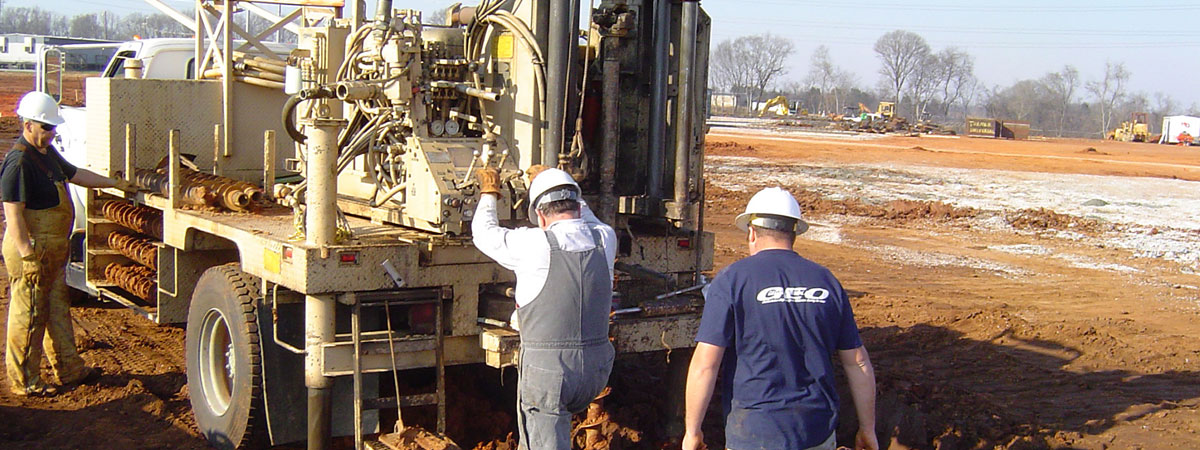The Interdisciplinary Approaches in the Geotechnical Sector: Connecting the Space Between Engineering, Geology, and Environmental Scientific Research for Optimal Task Outcomes
The assimilation of design, geology, and ecological science within the geotechnical sector is not simply helpful; it is critical for attaining optimum task results. What approaches might arise to facilitate this vital partnership and boost the efficiency of geotechnical techniques?
Relevance of Interdisciplinary Collaboration
The significance of interdisciplinary cooperation in the geotechnical market can not be overstated. Reliable geotechnical tasks call for the combination of varied proficiency from numerous fields, including design, geology, and environmental science. This collaboration guarantees that all aspects of a task are thought about, leading to comprehensive solutions that address intricate difficulties.
When working in seclusion,Interdisciplinary cooperation promotes technology by making it possible for experts to share understandings and approaches that may not be noticeable. By leveraging the strengths of multiple techniques, groups can determine potential risks, maximize style processes, and enhance the sustainability of geotechnical tasks. Furthermore, such collaboration promotes an alternative understanding of site-specific conditions, which is vital for accurate analysis and decision-making.
The intricacy of geotechnical projects necessitates a coordinated method to analytic. When engineers, geologists, and environmental scientists interact, they can produce a natural method that lines up technological requirements with environmental factors to consider and regulatory compliance. This harmony not just boosts project results yet additionally contributes to the long-lasting resilience of framework. Inevitably, interdisciplinary collaboration is necessary for advancing finest methods and attaining quality in the geotechnical industry.
Trick Duties of Each Self-control
Partnership amongst different self-controls is not just valuable; it is vital for the effective execution of geotechnical projects. Each discipline-- design, geology, and environmental science-- plays an unique yet interconnected duty that adds to project efficiency and sustainability.
Geotechnical engineers are mainly accountable for creating foundations and making sure structural honesty. They analyze dirt and rock residential or commercial properties to assess load-bearing capacities, supplying necessary data for secure construction practices. Their experience allows the formula of ingenious services to intricate obstacles.

Environmental researchers examine the possible effects of building on ecosystems and water resources. They carry out environmental evaluations and create reduction strategies to reduce unfavorable effects. By integrating eco-friendly factors to consider, they ensure compliance with policies and promote sustainability throughout the task lifecycle.
Study of Effective Combination
Successful assimilation of geotechnical self-controls can be exhibited via different situation researches that highlight the effectiveness of synergy in resolving complicated design difficulties. One notable example is the construction of the Hong Kong-- Zhuhai-- Macau Bridge, where a joint method including geotechnical engineering, geology, and ecological scientific research was important. Rock hounds and designers operated in unison to evaluate the seabed problems and maximize the structure style, making sure stability and reducing environmental impact.
An additional impactful instance is the enhancement of slope security in the San Francisco Bay Location, where an interdisciplinary team combined geotechnical analysis with environmental assessments. By incorporating geological studies and hydrological research studies, the team successfully recognized possible landslide threats and applied effective mitigation procedures, boosting security and sustainability.
In addition, the redevelopment of Brownfield sites frequently requires a multidisciplinary method. In one situation in Chicago, partnership among geotechnical engineers, ecological researchers, and metropolitan organizers led to the successful remediation of polluted dirt, permitting the risk-free change of the site right into an area park. These study highlight that interdisciplinary collaboration not just addresses technical obstacles however additionally fosters ingenious remedies that profit both jobs and neighborhoods.
Challenges in Multidisciplinary Projects

Additionally, collaborating routines and operations among different groups can be troublesome, specifically when each self-control has distinct job turning points and deliverables. This imbalance can result in hold-ups and enhanced costs. The challenge of source allotment likewise looms large; making sure that specific expertise is offered at important times needs careful planning and foresight.
Finally, regulative conformity positions another substantial obstacle. Each discipline may deal with different regulatory structures, and aligning these requirements to satisfy project purposes can be time-consuming and intricate. Resolving these obstacles requires strong leadership and reliable communication techniques to foster collaboration and make certain that multidisciplinary groups function cohesively in the direction of shared goals.
Future Trends in Geotechnical Practices
As the geotechnical market progresses, arising fads are reshaping techniques to attend to the difficulties faced in multidisciplinary projects - geo tech engineer. One considerable fad is the raised integration of sophisticated modern technologies, such as expert system and device understanding, into geotechnical evaluation and style. These innovations enhance anticipating modeling and danger analysis, enabling designers to make more enlightened decisions throughout the task lifecycle

In addition, the fostering of digital twins and real-time surveillance systems is ending up being more prevalent. These devices promote ongoing evaluation of dirt problems and structural efficiency, enabling timely interventions when issues arise.
Verdict
In final thought, the integration of engineering, geology, and ecological science is crucial for attaining optimal outcomes in the geotechnical industry. Interdisciplinary cooperation promotes development, boosts analytical capabilities, and lines up technical demands with ecological sustainability. Successful study highlight the advantages of this strategy, while acknowledging the difficulties encountered in multidisciplinary tasks. Looking ahead, embracing these joint methods will certainly be necessary for navigating future fads and progressing the field of geotechnical design.
The combination of design, geology, and environmental science within the geotechnical market is not merely useful; it is important for achieving optimum project end results. Effective geotechnical jobs call for the combination of varied proficiency from various look at here fields, consisting of engineering, geology, and environmental science.Navigating the complexities of multidisciplinary tasks in the geotechnical sector offers numerous substantial challenges.As the geotechnical sector progresses, emerging patterns are improving practices to resolve the difficulties encountered in get more multidisciplinary tasks. Geotechnical engineers are significantly working together with ecological researchers to make certain that projects align with sustainability objectives and conform with regulatory requirements.